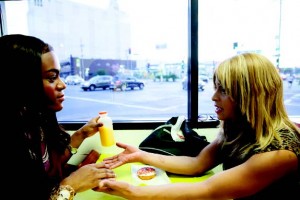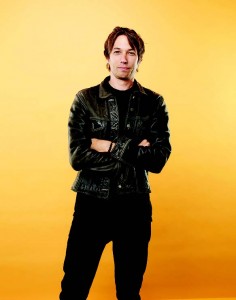 Frameline and June Pride are a wrap for this year, but queer films continue to play in Bay Area cinemas.
Frameline and June Pride are a wrap for this year, but queer films continue to play in Bay Area cinemas.
Boulevard, opening July 17, is a curious, melancholic character study of the sexually repressed Nolan (Robin Williams in his final leading role) coming to terms with his same-sex desires at age 60. Coping with a dying father, up for a promotion at work, and deceiving his wife (Kathy Baker), Nolan sabotages his carefully maintained life when he develops an obsession with Leo (Roberto Aguire), a street hustler. Paying the youth for talk not sex—which befuddles Leo—Nolan finds meaning in his life. But Boulevard feels stagy, not meaningful, and the contrived script is as dull and obvious as Nolan. Moreover, the erratic protagonist is not particularly sympathetic, despite Williams’ noble efforts.
Also opening July 17 is Tangerine, Sean Baker’s funky little comedy, shot entirely on an iPhone. The film, which is full of dram-ah, concerns motor-mouthed transgender prostitute Sin-dee (Kitana Kiki Rodriguez) finding out from her BFF Alexandra (Mya Taylor) that her boyfriend Chester (James Ransome) has been cheating on her while she’s been in jail. As Sin-dee wanders around Los Angeles on Christmas Eve, trying to find Chester, Alexandra wants to focus on her performance that night. Meanwhile Razmik (Karren Karaguilian), a cab driver, seeks out both ladies for personal reasons. The film thrives on its characters’ manic energy, but it is ingratiating because Sin-dee and Alexandra have tremendous heart. Baker spoke via Skype about making Tangerine.
 Gary M. Kramer: Sean, You tend to make films about marginalized, struggling, and/or disenfranchised characters. Why do these kinds of stories appeal to you?
Gary M. Kramer: Sean, You tend to make films about marginalized, struggling, and/or disenfranchised characters. Why do these kinds of stories appeal to you?
Sean Baker: I try to stay away from being too self-analytical. In all four of my films, I dealt with subject matter I didn’t know about. I think that those were small cultures I was interested in exploring. Each project began a different way and lead to what it became. With Tangerine, it was a street corner in LA that was infamous as a chaotic, red light district. I had just explored sex work in my previous film, Starlet. I think I’m doing a trilogy. It was pure curiosity that led me there. The collaboration of befriending and getting the trust of the people from that world is how the stories were developed.
Gary M. Kramer: What can you say about the portrayal of the transgender prostitute characters?
Sean Baker: Mya told us something early in the process that made us make a comedy. She was enthusiastic about the film, but asked me to promise to show what the transgender women of color who do sex work go through out here with brutal honesty, even if it’s un-PC. And she wanted it to be funny, and “made for the girls,” not like it was a National Geographic style film. She said that humor is how we get through this. I said it was going to be a balancing act. These women are images that we have all seen before in cinema or TV, but for me, they were always caricatures, or used as the butt of jokes, never developed, or fleshed out. I think that people might say we don’t want to see this image again. I wanted to humanize these women and give them a story that while it might play out only in that world, the themes of friendship and infidelity are universal and viewers can identify with them.
 Gary M. Kramer: How much of the film was improvised?
Gary M. Kramer: How much of the film was improvised?
Sean Baker: For the girls’ dialogue, improvisation was encouraged. Chris [Bergoch, the co-writer] and I recorded every interview we did. We used the interviews as a guide for the dialogue. I gave the characters the script and told them, if you don’t like it, put it into your words, and that’s what they did. They sometimes said the script, or came to the table with their own wording. The only time we couldn’t deviate from the script was during the Armenian dialogue, because I don’t know Armenian.
Gary M. Kramer: There’s a fantastic scene in a car wash, but you cut away in the middle of it, which both increases and interrupts the dramatic moment. Can you discuss that strategy?
Sean Baker: The car wash was a scene I wanted to shoot—a long take in the car wash. I didn’t know what I would do and when Mya told me that women take their clients into the car wash for a quickie, that’s what led us to write that scene. What I did with the music and the cuts were abrupt and jarring. I edit my own films. It’s done organically, following my instincts.
© 2015 Gary M. Kramer
Gary M. Kramer is the author of “Independent Queer Cinema: Reviews and Interviews,” and the co-editor of “Directory of World Cinema: Argentina.” Follow him on Twitter @garymkramer
Recent Comments